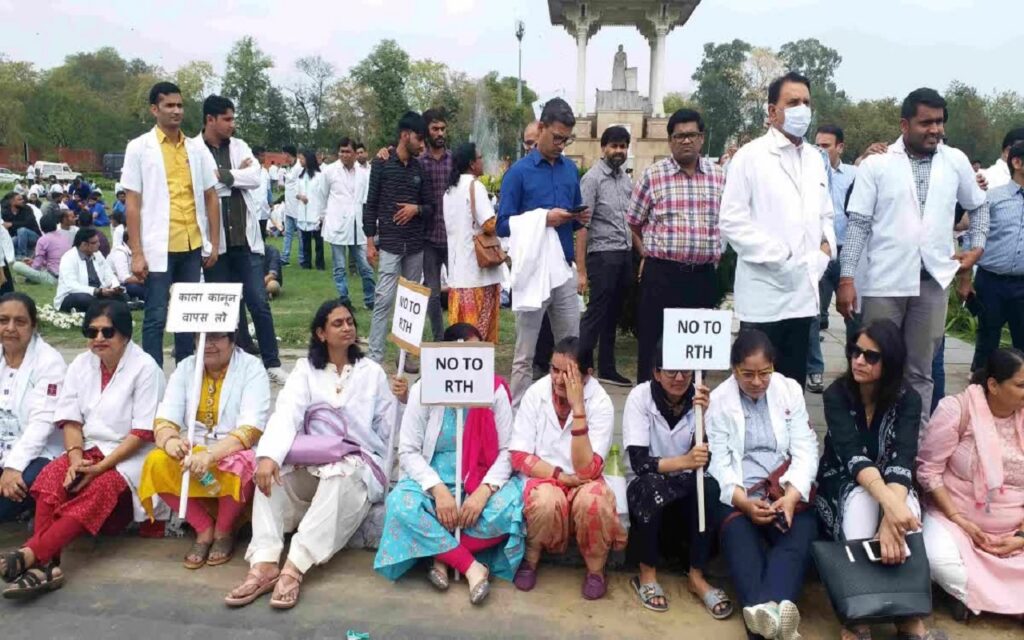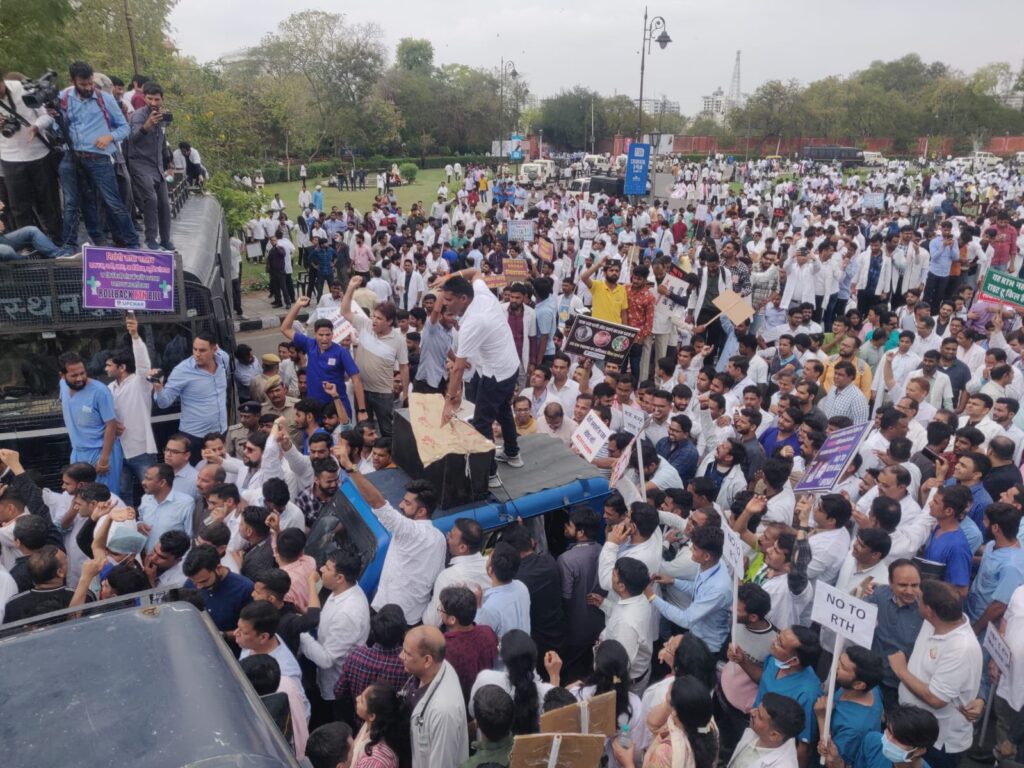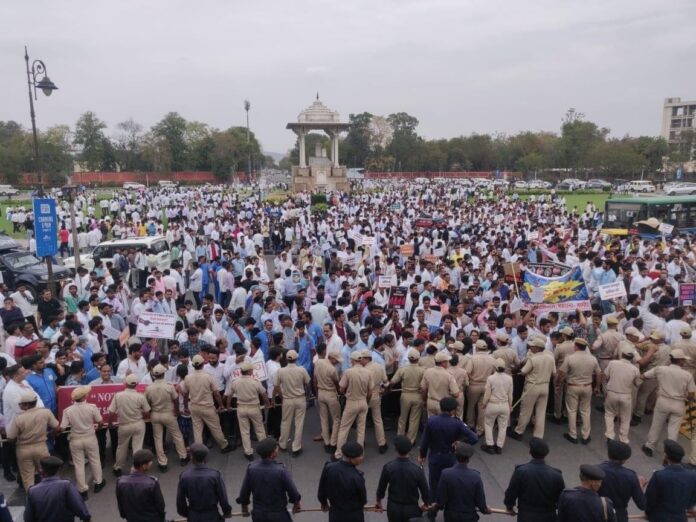By Our Correspondent
JAIPUR—Having emerged as the first and the only State in the country to give its residents the statutory right to health, Rajasthan is witnessing intense opposition from the private hospitals and the doctors and paramedical staff working in them. The private doctors are up in arms against the Right to Health Bill, 2022, passed in the State Assembly on March 21 with a voice vote.
The Bill has made a provision for mandatory free-of-cost emergency treatment for every resident of the State at both government hospitals and privately-run institutions. In addition, it gives every person of Rajasthan the right to emergency treatment care “without prepayment of requisite fee or charges” to any public health institution, health care establishment and designated health care centres.
The private hospitals and nursing homes across the State have been closed ever since the Bill was passed, and their staff members have been organising meetings and holding demonstrations. With the deadlock continuing, the private doctors protesting against the Bill stepped up their agitation and took out a massive rally in Jaipur in a show of strength on March 27. The doctors are adamant in their demand for an immediate rollback of the Bill.

Expressing solidarity with the doctors of Rajasthan, the Indian Medical Association (IMA) has also called for a nationwide bandh, in which all medical services should be stopped. Thousands of doctors, accompanied by their family members, paramedical staff and chemist shop owners, participated in the rally, which started from the resident doctors’ hostel ground of Sawai Man Singh Government Hospital. The medicos carried banners and placards, raised slogans with the demand for Bill’s withdrawal and wound their way through the roads of Jaipur.
The closure of private hospitals and nursing homes has led to increased pressure on the government hospitals in the State, where long queues of patients are witnessed every day. The resident doctors in government hospitals have also extended support to their peers in the private sector and are boycotting the work. As a result, only senior doctors attend to the patients in government hospitals.
The private hospitals are apprehensive of the government’s interference in their functioning following the enforcement of the right to health legislation. However, a meeting of the agitating doctors with Chief Secretary Usha Sharma and senior government officers in Jaipur last week remained inconclusive, as the medicos affirmed that any discussion would be possible only after the Bill was withdrawn.

Private Hospitals & Nursing Homes Society’s secretary Vijay Kapoor said the Bill was unconstitutional and the doctors would not budge until it was withdrawn. “We will discuss the errors in the Bill only after it is withdrawn. We want a written assurance from the government on this,” Dr. Kapoor said after the talks ended.
On the other hand, Chief Minister Ashok Gehlot has appealed several times to the doctors to withdraw their strike, saying it was not in the public interest. In a full-page appeal published in all newspapers on March 28, Gehlot pointed out that the pubic welfare law had been prepared with the consent of doctors and the opposition to it by the medical community was beyond comprehension. “Some elements are spreading confusion about this law, which is unfair,” he said.
The ruling Congress had promised to legislate the right to health in its manifesto for the 2018 Assembly election. The delay in bringing the law had caused serious concern among health activists. Gehlot pointed out that the treatment in the cases of emergency and accidents will be started immediately without any prior payment of fees and charges and without waiting for the police report, and the State Government will make its payment. According to the Chief Minister, social security has been provided to the doctors, medical personnel and medical institutions, and their financial interests have been protected in the Bill.
The Right to Health Bill was tabled in the State Assembly on September 22, 2022, and was later referred to a Select Committee, which held detailed deliberations with all stakeholders before submitting its report. As a result, it was agreed that the State Government would reimburse the expenses to the health care provider if a patient was unable to pay the requisite charges after emergency care, stabilisation and referral.
However, private doctors are protesting against the Bill with a contention that its “draconian provisions” will stifle the private health sector. The agitating doctors have affirmed that the amendments they suggested to the Select Committee were not carried out. The Bill has made it mandatory to provide free treatment without defining an emergency.
The State Government says that the private doctors’ demand for withdrawal of the Bill is not justified, as it had been amended based on several of the suggestions they submitted. The State Government, which has allotted land to several big hospitals on concessional rates, affirms that they are duty-bound to treat all patients. “Private hospitals cheat the patients in the name of treatment. We will take legal action against them after this Bill becomes the Act,” Medical and Health Minister Parsadi Lal Meena said during a two-hour-long debate on the Bill in the Assembly.
The Bill makes it mandatory for hospitals to provide treatment in emergency cases without waiting for medico-legal formalities and give medicines and transport facilities without charging money. Implementing the law is expected to eliminate out-of-pocket expenditure and bring transparency and accountability within the health care system.
The Jan Swasthya Abhiyan (JSA)-Rajasthan, representing the health rights activists, has welcomed Bill’s passage in the Assembly but has expressed concern over some gaps in the law. JSA coordinator Chhaya Pachauli said the law should apply to all patients irrespective of their residential status; the grievance redressal authorities should have a wider representation and the helpline and web portal option should be given for making complaints.
The JSA-Rajasthan had prepared a draft Act on the subject and submitted it to the Health Department’s authorities shortly after the new government was formed in December 2018. The Bill introduced in the Assembly was based on this draft, which was also put up in the public domain in March 2022. During the legislative process, the private hospitals and nursing homes had boycotted the State government’s health schemes, including the flagship Chiranjeevi Yojana. They refused cashless treatment to the patients in protest against the Bill.
The Right to Health Bill has been perceived as a radical medical reform brought in by the Congress Government in Rajasthan ahead of the State Assembly election, which will be held in December this year. It will benefit lakhs of people who get free treatment in emergency cases. Health Minister Meena has affirmed that the State Government will not take back the Bill at any cost.
The State government is also reportedly considering action against the private hospitals because of the continuing agitation. The Health Department has been asked to provide complete information about the hospitals functioning across the State. If the deadlock continues, actions such as cancellation of allotment of land, suspension of licence to operate and demolition of illegal construction on the hospital premises may be taken soon.





